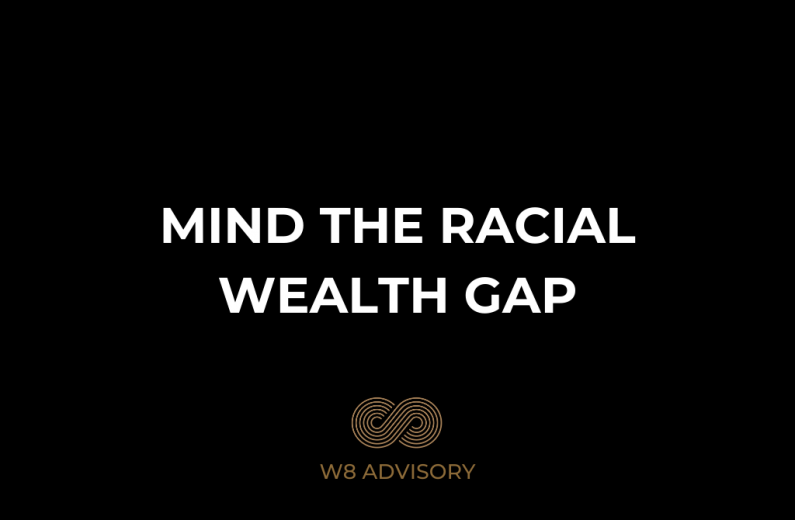
So let’s talk about the racial wealth gap; it’s real, it’s endemic and it has been built on centuries of white privilege in the USA (and other countries), that has made it difficult for black people to achieve economic security. The horrible unlawful killing of George Floyd at the hands of law enforcement agents in Minneapolis USA on 25th May 2020 has sparked the largest social unrest and protest marches in the USA and worldwide since the civil rights protests of the 1960s. Same story, different generation; same battle, different generals; same noise falling on the seemingly deaf ears of the same white establishment. A feeling of déjà vu perhaps, for those of us old enough to recall the Los Angeles riots in 1992 which were sparked by the unlawful arrest and merciless beating of Rodney King again and by four police officers (who were never convicted though charged) and part of the inspiration which led to the first ‘million man march’ of 1995. Once more, we take to the physical streets to voice our anger and to the digital highways to cry out in horror and disgust, about how once again black peopleare being disrespected, ill-treated, oppressed and de-humanised. Thanks to the internet, the images of the police officer coldly taking the life of another human being, in the manner of a hunter with his prey, is embedded on our minds and those of our children.
And then, the streets will gradually quieten down as we all head back to deal with our households, our families and the vagaries of a never-ending pandemic that rears its head again to grab our attention. The protesters will go home, the government may (or may not) make noises and gestures of appeasement. Hopefully, the policemen will be prosecuted to serve an appropriate punishment for their dastardly acts against humanity. And then – we wait until the ‘next time’; because there will always be a next time! For as long as the systemic racism which re-enforces the deep economic divide between black and white households in the U.S. and globally, continues to persist, there will probably be a next time.
The tragic killing of George Floyd comes at the worst time in the contemporary history of the U.S and the world. The present global covid-19 pandemic has shown up the racial disparity, hot on the heels of the recently coined “Black Lives Matter” movement (which was inspired by the unlawful killings by law enforcement of black men and women in the US.) The data shows that black people die of Covid-19 at twice the rate of other races in the US and also in the UK. It is said that this is because black people make up a disproportionate share of low wage workers who had to keep working even at the height of the pandemic, in jobs such as bus drivers, in food processing plants, grocery stores and in the hospital and health care ecosystem. Research also shows that black households are being hit by more job loses than white households and have limited or poor access to health care in the US whilst generally being more likely to have underlying health conditions like diabetes or high blood pressure linked to their economic status.
The racial wealth divide is a living breathing reality. The anger and the bitterness in the voice of protesters this week is not only about the unlawful killing of another black man, but also the roar of a people, frustrated, enraged by the generations of social injustice; After the dust settles into an apprehensive calm, the closing of the social racial wealth gap must become a priority for the US government’s broader economic policy.
Let’s examine the racial wealth gap; e.g. the average white household in the US has 700 times more wealth that the black households which translates in $171,000 for the white household and $17,600 for the black household (1). Home ownership accounts for two-thirds of wealth of most people in the US, yet a certain level of housing discrimination ensures that black people can only afford and have access to housing in deprived inner cities which are not located close to good schools or good jobs opportunities. A Mckinsey Report in 2019 (2) on the persistent racial wealth gap in the US states that it is “a burden on black Americans as well as on the overall economy”. Apparently, the racial wealth gap grew from about $100,000 in 1992 to $154,000 in 2016.
How do we tackle this widening wealth gap that limits economic power and prospects of black people? So far, this phenomenon has been cyclical – from generation to generation; and so we see history repeating itself in the repeated incidents of black lives being violated, oppressed and even terminated  because they are the weakest and least valued in society. The barriers of building wealth for black families are numerous. The Mckinsey Report suggests 4 elements that can contribute to a family’s ability to surmount the wealth gap and to build wealth across generations; these are family income, family savings, family wealth and the community in which the family lives. Of these 4 elements, family income and family savings are the most important, the building blocks of wealth creation. The family’s income refers to the family’s cash flow received from employment and entrepreneurship. The family’s savings refer to the family’s ability to save and invest money as a route to wealth creation. If you live in a stable country (like the US) and can invest long term, the value of your savings pot would tend to increase over time. The secret is ‘compound interest’ e.g. $100 invested in the US stock market in 1863 with average returns of 7% over time would have grown to $3.5m in 2021. Access to investible assets will ensure the family’s ability to build generational wealth.
because they are the weakest and least valued in society. The barriers of building wealth for black families are numerous. The Mckinsey Report suggests 4 elements that can contribute to a family’s ability to surmount the wealth gap and to build wealth across generations; these are family income, family savings, family wealth and the community in which the family lives. Of these 4 elements, family income and family savings are the most important, the building blocks of wealth creation. The family’s income refers to the family’s cash flow received from employment and entrepreneurship. The family’s savings refer to the family’s ability to save and invest money as a route to wealth creation. If you live in a stable country (like the US) and can invest long term, the value of your savings pot would tend to increase over time. The secret is ‘compound interest’ e.g. $100 invested in the US stock market in 1863 with average returns of 7% over time would have grown to $3.5m in 2021. Access to investible assets will ensure the family’s ability to build generational wealth.
The racial wealth gap is not only an American problem: The UK’s Department of Work and Pensions found that 60 percent of black and Asian households have no savings at all, compared to 33 percent of white households. The UK’s first Wealth and Assets Survey in 2009 reported that while the average white household had £221,000 (roughly $350,000) in assets, Black Caribbean households had £76,000, Bangladeshi households £21,000 and Black African households £15,000. These figures may be dated, but the reality is not. There are a few explanations for these low levels of asset-holding. First, is that ethnic minorities and migrants in the UK – and indeed in Europe – are more likely to earn low incomes. A second reason for lower asset-holding is that migrants are unlikely to inherit assets – a family home or savings — in the country where they now live in Europe. And a third reason is the lower levels of home ownership among ethnic minorities (3). The racial debt gap disproportionately affects black and Asian households in the UK. Systemic inequalities mean there are limitations on earning and progression potential – which all increases the risk of falling into debt – and make it harder to get out of. Many young people are struggling with debt that has arisen due to carelessness and a lack of awareness about their personal financial situation. Increased financial literacy, access to investible assets and a consistent message emphasising the long-term benefits of financial empowerment, are key to the financial wellness that is intrinsic to the success of the ‘black lives matter’ movement.
 In 2018, the Fortune 500 CEOs who earn approximately $14.5m on average included only 4 black people. However black people make up 12.7% of the US population. Of the 2,153 people on the 2019 Forbes List of the world’s billionaires, only 13 are black, with the richest black person being Aliko Dangote at $10.1b closely followed by another Nigerian Mike Adenuga at $7.7b (4). It is surprising that neither of these black men live in the US, the land of the ‘American dream’. When will it be the norm to have black entrepreneurs and innovators like the late Steve Jobs and Bill Gates? The social injustice created by the housing disparity in many countries, not only the US, means that black children will generally have access to poor performing schools and will be exposed to gang culture and are more likely to end up on the ‘wrong tracks’, which deepens and widens the wealth gap between the races.
In 2018, the Fortune 500 CEOs who earn approximately $14.5m on average included only 4 black people. However black people make up 12.7% of the US population. Of the 2,153 people on the 2019 Forbes List of the world’s billionaires, only 13 are black, with the richest black person being Aliko Dangote at $10.1b closely followed by another Nigerian Mike Adenuga at $7.7b (4). It is surprising that neither of these black men live in the US, the land of the ‘American dream’. When will it be the norm to have black entrepreneurs and innovators like the late Steve Jobs and Bill Gates? The social injustice created by the housing disparity in many countries, not only the US, means that black children will generally have access to poor performing schools and will be exposed to gang culture and are more likely to end up on the ‘wrong tracks’, which deepens and widens the wealth gap between the races.
There is no single solution to curing endemic racism which has been woven into the fabric of a society. The much needed change lies in the hands of the next generation. Financial literacy for the young black man and woman is a fundamental life lesson that holds the key to change. If they can be taught and encouraged, regardless of their background, of the need to focus on wealth creation through work and entrepreneurship; on saving, on investing, to increase their life opportunities through financial empowerment; to stand on the shoulders of the black men and women who fought for racial equality, then perhaps all those black men and women (from Rodney King to Amadou Diallo, Eric Garner, Sandra Bland, Breonna Taylor, Michael Brown, Freddie Grey to George Floyd) would not have suffered, been persecuted and even been killed in vain. Those who have gone before us have given us the much needed breath to exhale.
References
- Inequalty.org
- Mckinsey Report 2019
- The Metro Newspaper (30 Nov 2019)
- Forbes Rich List 2020



